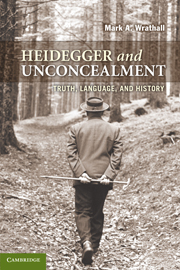Book contents
- Frontmatter
- Contents
- Acknowledgments
- Credits
- Introduction
- Part I Truth and Disclosure
- Part II Language
- Part III Historical Worlds
- 8 Philosophers, Thinkers, and Heidegger’s Place in the History of Being
- 9 Between the Earth and the Sky: Heidegger on Life After the Death of God
- 10 Nietzsche and the Metaphysics of Truth
- Works by Heidegger
- Index
- References
9 - Between the Earth and the Sky: Heidegger on Life After the Death of God
Published online by Cambridge University Press: 05 June 2012
- Frontmatter
- Contents
- Acknowledgments
- Credits
- Introduction
- Part I Truth and Disclosure
- Part II Language
- Part III Historical Worlds
- 8 Philosophers, Thinkers, and Heidegger’s Place in the History of Being
- 9 Between the Earth and the Sky: Heidegger on Life After the Death of God
- 10 Nietzsche and the Metaphysics of Truth
- Works by Heidegger
- Index
- References
Summary
In the last decades of his life, Heidegger was preoccupied with the dangers of technology, and tried to articulate a nontechnological form of “poetical dwelling” that could save us from those dangers. On Heidegger’s account, dwelling consists in achieving a nearness to the earth, the sky, mortals, and divinities.
Viewed with the kind of historical detachment exemplified in Charles Taylor’s paper, “Closed World Structures,” Heidegger’s reaction against technology is just one ripple in the “wave of protests” that formed what Taylor calls the “nova effect” – that is, “the multiplication of more and more spiritual and anti-spiritual positions.” Such a multiplication, in turn, “further fragilizes any of the positions it contains” in the sense that it undermines the claim of each position to legitimacy. This is because the disagreements between positions are disagreements at the most fundamental levels. As a consequence, Taylor argues, “there is no longer any clear, unambiguous way of drawing the main issue” – the issue at hand being the nature and place of religion in a postmetaphysical, technological age.
- Type
- Chapter
- Information
- Heidegger and UnconcealmentTruth, Language, and History, pp. 195 - 211Publisher: Cambridge University PressPrint publication year: 2010



